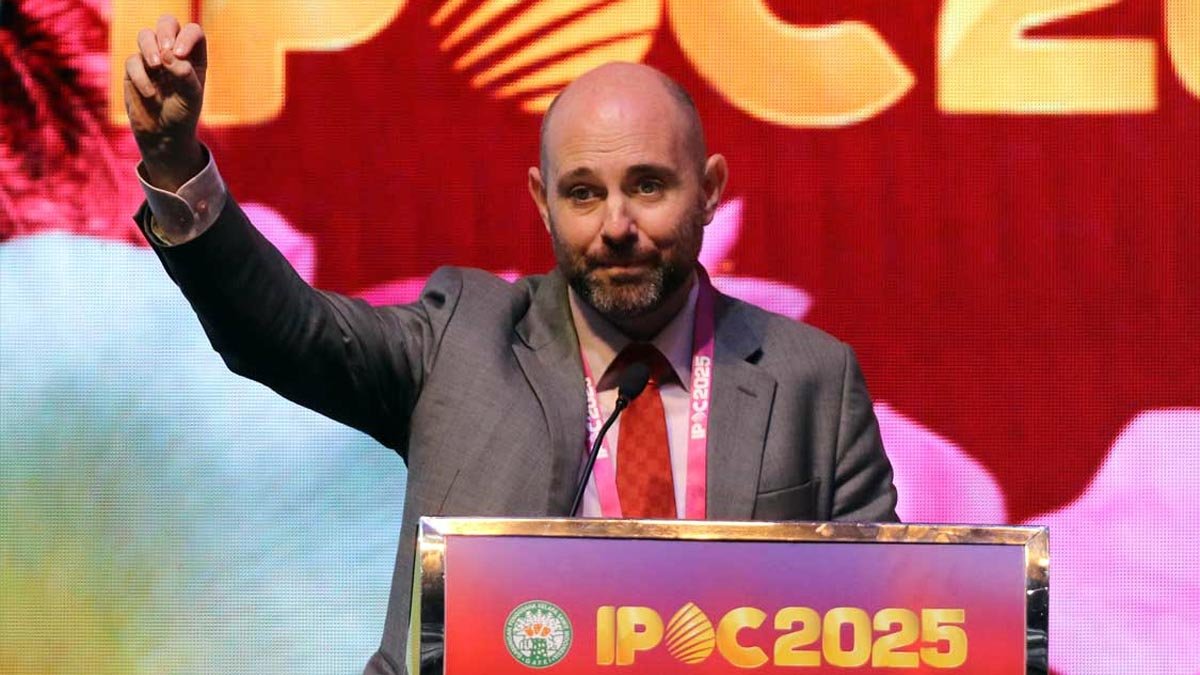PALMOILMAGAZINE, NUSA DUA – The Indonesian government’s accelerated push toward implementing the B50 biodiesel mandate has drawn serious attention from global analysts. While the ambition to strengthen national energy security remains strong, the rapid shift toward B50 is seen as a move that could expose Indonesia to significant fiscal risks and destabilize the palm oil market—one of the country’s core export pillars.
In an interview on the sidelines of the Indonesia Palm Oil Conference (IPOC) 2025 at the BICC The Westin, Nusa Dua, Julian Conway McGill, Managing Director of Glenauk Economics, said the swift transition from B30 and B40 to B50 has created disproportionate market expectations. “Indonesia’s biodiesel program has been too successful,” he told Palmoilmagazine.com, Friday (14/11/2025).
According to McGill, the market assumes biodiesel demand will continue rising, keeping CPO prices elevated even before the policy is fully implemented. Ironically, this happens while global diesel prices are falling, widening the cost gap in biodiesel production. “The problem is global diesel prices have dropped, making the CPO–diesel spread even larger,” he explained.
Also Read:
This spread is the single largest component of biodiesel production costs. For that reason, McGill argued that financing B40 is already challenging—let alone B50. A hike in export levies is seen as almost unavoidable, but such a move risks undermining export competitiveness and discouraging upstream investment.
He also highlighted Indonesia’s stagnant palm oil productivity. High export levies and complicated land legality issues have made investors reluctant to expand new planting areas. “No agricultural sector can improve productivity when prices are constantly pushed down by heavy taxation,” he said.
McGill warned of a potential risk cycle: if production stalls while biodiesel consumption continues to rise, exports will decline, levy revenues will drop, and eventually the government will be forced to raise levies again. “The situation becomes increasingly difficult,” he noted. Major importers like India and Pakistan are particularly vulnerable to price increases, while in China and Europe, palm oil already faces competition from abundant soybean supplies and tightening regulations.
Also Read:
From an industrial standpoint, Indonesia’s biodiesel production capacity is also not fully prepared to meet B50 demand. “Before B50 is rolled out, additional investment in production capacity is still urgently needed,” McGill said.
Even so, he acknowledged Indonesia’s strong technical capabilities. What was once considered impossible at the B10 stage has now reached B40 with smooth implementation. However, he cautioned that technical capability does not justify pushing ahead without strategic consideration. “The question is not whether Indonesia can do it, but whether this is the right moment,” he emphasized.
McGill offered a solution: adopting a flexible mandate similar to Brazil’s sugar–ethanol model. Under this system, biodiesel blending rates adjust to fluctuations in CPO and diesel prices—reducing uptake when prices rise and increasing it when prices fall. “With the right timing, Indonesia could secure up to four times more biodiesel output at the same cost,” he said.
Amid Indonesia’s bold energy transition ambitions, McGill stressed that speed alone does not define success. “Energy security is best achieved with the right momentum, not by accelerating as fast as possible,” he said.
His warning carries a clear message: the success of Indonesia’s biodiesel program hinges not only on achieving higher blend rates but on maintaining a delicate balance between energy security, fiscal stability, industrial capacity, and global market dynamics. (P2)
